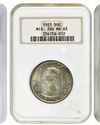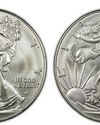
Official U.S. silver coins were first minted in 1794, and the new coinage system of the United States revolved around the silver dollar, as this was the base unit. The U.S. silver dollar, in turn, was based upon the Spanish milled dollar (8 reales coin).
Before the 20th century, the main unit of money in a society was generally defined by a physical amount of gold or silver. Throughout history, however, an amount of gold or silver that was determined by a government to define a unit of money was subject to change for political or economic reasons.
To understand the U.S. dollar in the present, it may be necessary to have some understanding of how it came about. To think about the history of the dollar and U.S. coinage in the past, it helps to refer to grains.
For centuries, grains were used as a measure of weight for many things, including gold and silver. 480 grains equals one troy ounce and 5.500 grains equals one troy pound. 7.000 grains equals one standard or regular pound. Original amounts in grains tend to be clearer and more straightforward then their equivalents in troy ounces, which are usually awkward approximations.
Amounts in grains can easily be understood in troy ounces if it is remembered that 480 grains equals one troy ounce, but a conversion from an historically noteworthy number of grains to troy ounce may include many digits to the right of a decimal point. For example, before the Coinage Act of 1853, a dime was mandated to have 37.125 grains of silver, a number that seems sensible and can be remembered. The conversion, however, works out to 0.07734375 troy ounce, a number that is awkward and difficult to remember. Ten times this number, 0.7734375 troy ounce, is the amount of silver in a U.S. silver dollar, which is better remembered as 371.25 grains.
This story is from the October - November 2024 edition of COINage Magazine.
Start your 7-day Magzter GOLD free trial to access thousands of curated premium stories, and 9,000+ magazines and newspapers.
Already a subscriber ? Sign In
This story is from the October - November 2024 edition of COINage Magazine.
Start your 7-day Magzter GOLD free trial to access thousands of curated premium stories, and 9,000+ magazines and newspapers.
Already a subscriber? Sign In

Top 6 Most Popular U.S. Commemorative Coins
During a half-century of researching U.S.commemorative coinage, I have found that these are the top six U.S. commemorative coins favored by collectors, dealers and investors.

GUIDE TO GRADING SILVER AMERICAN EAGLE ONE-OUNCE BULLION COINS
CAC'S MODERN COIN MINT STATE GRADING STANDARDS

TOP Jen U.S. Gold Coins
LIST OF STRONG PRICES AT SPECTACULAR AUCTIONS

$7,500 GOLD BY THE END OF THE DECADE?
\"Gold can easily triple by the end of 2030,\" declares Maurice H. Rosen, the prominent Plainview, New York, gold coin prognosticator and award-winning writer.

PCGS Coin Grading 101
In 1986, the numismatic world changed when Professional Coin Grading Service (PCGS) entered the scene as a third-party certification service to authenticate, grade and encapsulate coins at scale.

HOW TO USE THE COIN VALUES LIST
Coin values are provided beginning with small cents through Double Eagle gold pieces and beyond, and many of the popular modern coins in between, all based on The Insider's Guide to U.S. Coin Values, 21st Edition, by Scott A. Travers (www.usgoldexpert.com) and updated for accuracy.

THEINSIDER'S GUIDE TO U.S. COIN VALUES 23RD EDITION
ULTIMATE LIST OF COIN PRICES

Coin Dealers Attacked, Targets of Organized Crime
Coin dealers nationwide have become the latest victims of organized crime, facing targeted attacks following their attendance at coin shows.

Should You be Paying Sales Tax on Your Bullion and Coin Purchases?
THERE ARE MANY IMPORTANT EXCEPTIONS AND EXEMPTIONS

Physical Format Bitcoin Gains Collector Acceptance
PRICE RECORDS CONFIRM MARKET DEMAND